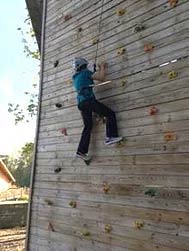Blog,
Michael Phelps’ Top Five Tips to Mentally Tune Himself For Success

Everyone wants to be more successful, right? No matter how we define it, each of us has goals that we want to achieve. How confident are you that you will meet them, especially the big scary ones that bring butterflies to your stomach.
If you are like me, you love hearing about the accomplishments of others, but walk away thinking that is not for me. This time however, I paid closer attention to an interview with athlete extraordinaire Michael Phelps and John Fortt, CNBC host. As a coach who spends a great deal of time working with my clients on mindset, I wasn’t surprised that Phelps said for a swimmer, natural ability just doesn’t cut it. He explained that he also had to tune himself mentally. This is something he was taught at a very early age and unarguably all kids would benefit from learning.

This reminded me of a weekend retreat I attended where we were given an opportunity to scale a 25 foot climbing wall. No big deal, right? Except that I was freaking out that I would not be able to make it. I had my usual excuses; I had never attempted this before, I did not have the necessary skill, and I was afraid I would fail in front of friends and colleagues. So I decided to put all my skills and tools to the test. I spent the entire night visualizing myself over the wall and my mantra was a riff on Nike’s slogan. I CAN do it, I AM doing it, I HAVE done it! Needless to say, I barely slept that night because I was continually repeating my battle cry and visualizing myself over the wall.
Climbing the wall was probably one of the hardest physical challenges I’ve endured. Every time I got half way up I missed the next step and came crashing down, swinging hard against the wall. I wanted to give up and tell myself I had made a valiant effort, but I could not stop thinking I AM over the top and eventually, after about 20 minutes (it felt much longer) I reached the top.

My fingers were frozen stiff from the cold and numb from grasping. My legs were bruised from repeatedly slamming against the wall and were shaking from the exertion, but I finally made it over the top!! Once I reached the summit I was reminded again of something I teach people. The single most important quality to cultivate success is not being smart, experienced, or having the right situation and circumstances. While these conditions may seem important, they are simply mind games we play with ourselves that keep us from our full potential. Skills will be learned and knowledge will be gained over time. Instead, we would do well to train our brain and emotions to anticipate and experience success and tune out debilitating self-doubt and our litany of “yeah-buts.”
Even though most of us are not aiming for world domination in swimming, Phelps’ tips and “mental exercises” for success are applicable to all of us in our everyday lives:
Articulate Goals – All successful people report they write down their goals. Phelps stated he kept his on his night stand. I recommend that you spend a few minutes every day (preferably at the same time each day), writing down your goals as though you have already achieved them. This simple exercise is a powerful way to train your brain to expect success.
Decide To Be The Best You – Phelps did not want to be the next Mark Spitz, former swimmer who held the previous world recorder holder in seven events. Instead he wanted to be the best Michael Phelps. Once you have identified your goals, imagine that you have accomplished them. How does that feel? What does feeling accomplished look like for you? Does it make you excited, eager, or motivated? Regularly tuning into these emotions as you work to accomplish your goals will help energize and remind you why this is important to you.
Eliminate Can’t – Phelps said one of the keys to him being so successful is that at an early age a coach of his encouraged him to stop saying “can’t,” which allowed him to broaden his mind and believe that he could achieve whatever he wanted to. One of my coaches encourages us to replace “can’t” with “not yet.” This allows us to entertain the possibility that it can happen.
Set Lofty Goals – Phelps said that as a kid he would think and dream as big as he possibly could. So go ahead and test yourself! You will never know how far you can go unless you give yourself the permission to go big. Author Albert Camus famously said “What we can or cannot do, what we consider possible or impossible, is rarely a function of our true capability. It is more likely a function of our beliefs about who we are.”
Seeing The Darkest Of The Dark – As we experience life we become aware of both the light and dark aspects within us. Phelps talked about learning things about himself that he never knew or even wanted to know. His life changed for the better when he acknowledged the parts of him he did not feel confident about or particularly like. Looking back, he said his friendships are stronger, family is tighter and he is happier. Recognizing and coming to terms with that unwanted part of ourselves, instead of avoiding or repressing it, helps us become more comfortable with who we are. This frees up our creative energies to accomplish more and enjoy life.
Naheed Oberfeld
www.OberfeldCoaching.com